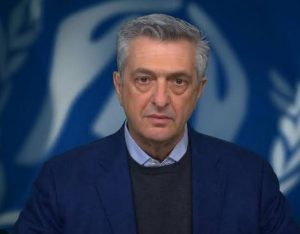Refugee Week marked as displaced numbers hit 120 million
Continuing conflicts in Gaza and Sudan have seen a record-breaking 120 million people forced to flee their homes by war, violence and persecution.
The number represents the 12th year in a row the number has increased, the UN refugee agency UNHCR has said.
The global displaced population is now equivalent to that of Japan, the agency said.
In Sudan, war that started between rival generals in April 2023 pushed more than nine million people from their homes.
In Gaza, the war between Israel and Hamas has displaced an estimated 75% of the population – 1.7 million people – since October.
The world’s largest displacement crisis remains in Syria, where a conflict that started in 2011 keeps nearly 14 million people from their homes.
Millions more people were driven from their homes in the Democratic Republic of Congo and Myanmar because of fighting last year.
UNHCR chief Filippo Grandi called the numbers a “terrible indictment on the state of the world”.
 Speaking ahead of World Refugee Day, he called on governments to tackle the root causes of the problem, rather than politicising refugees and turning to quick fixes such as closing borders, which he said would not solve the problem.
Speaking ahead of World Refugee Day, he called on governments to tackle the root causes of the problem, rather than politicising refugees and turning to quick fixes such as closing borders, which he said would not solve the problem.
Instead, he urged countries to work together for more durable solutions.
UNHCR said the vast majority of refugees were in neighbouring and low and middle-income countries, and not to wealthy nations.
The number of displaced people globally has nearly tripled since 2012 and is likely to increase, Mr Grandi said.
“Unless there is a shift in international geopolitics, unfortunately, I actually see the figure continuing to go up,” he said.
UNHCR condemned warring parties, saying conflicts that violated international law drove displacement.
“My message to governments is that, first of all, a more welcoming and humane policy of receiving people can also be more effective, more rapid, and function better,” Mr Grandi said.
“That would not solve all the challenges, but certainly some of them, and would also send a better message about efficient determination of whether people are refugees or not, for example, and that for those that do not have any valid reasons to stay, there are ways to send back humanely to their countries.
“So, there is an efficiency element that I think can and should be worked on. It requires resources, clearly, but resources spent for a good cause.
“Second, in these very long journeys of these people, be they across the Americas or North Africa to Europe, too much attention is on the last border, which is usually the border of a rich country, because this is where the politics play out. This is where the media focus. But what about these long journeys? A lot can be done before people arrive at the last border.
“First of all, I think we need to be much more strategic in addressing the root causes of these movements. Even in transit, people can be given opportunities and states build their capacities to deal with the transit. It would reduce the pressure at the end.
“Don’t forget, of the 120 million refugees and displaced people that we count across the world, 75 percent are in poor countries or middle-income countries. They’re not in the rich countries. We always have this perception that the problem is all here. So, it’s upstream that we need to work on.”
Mr Grandi said the global refugee population, now at about 43.4 million, is triple what it was a decade ago.
“This is an important question as to why there has been this increase. The figure actually has basically gone up and up and up and up for 12 consecutive years now. And if you look at the history of the last 12 years, it’s a history of some huge conflicts like Ukraine, like Gaza, like Sudan, like Myanmar,” he said.
“And it’s a history of older conflicts not getting resolved. This is a world that has become unable to make peace. The systems put in place after World War II to make peace are so obsolete, so out of date, that frankly, it doesn’t work anymore.
“And that means that this accumulation of conflicts with all the refugees and displaced people that it carries with it is growing every year.
“The system I’m part of is the response system to that. I’m talking about the political system that is tasked with maintaining peace and security, the UN Security Council, the regional organisations tasked with peace and security. That’s essentially states, of course, gathered in the UN as a political organisation.
“This is what is obsolete and not functioning anymore. If you look at what the Security Council does, or rather doesn’t do, it’s not even able to agree on the most basic humanitarian resolution anymore.
“That says a lot about the state of the world, with the consequences falling then on the response system, which we are part of. That system also can be improved, but the root cause of this is the political system that is paralysed,” Mr Grandi said.












